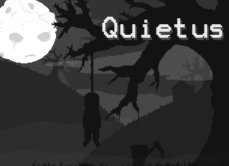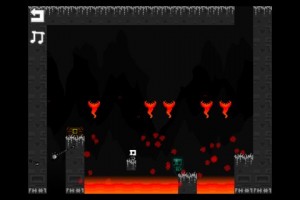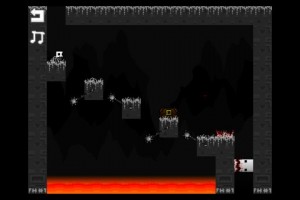 1001 Ways to Die
1001 Ways to Die
Death took your life. Then he took your flesh. And then your virtual D-pad by the looks of things. But he’ll give it all back to you – minus the virtual D-pad for now – if only you can complete a gauntlet of 40 levels in a fiery underworld, where the most innocuous things you’ll encounter are volcanic chutes that have the courtesy to help you clear obstacles without vaporizing you on contact. Everything else, from giant lava worms, to vengeful ghosts, to the ashen turf below your feet, is prepared to devour or otherwise pulverize your skeletal remains.
The player’s ill-fortuned and retro-pixelated avatar faces some frightening prospects in Quietus (Out Now, $.99)! Realistically, the average player simply doesn’t stand a snowball’s chance here, as Connor Ullmann has created a little slice of heaven tailored very specifically to the needs of 2D platforming enthusiasts who are seeking the next ultimate challenge. For everyone else, the Quietus experience is sure to feel like a trip through Hell.
 As an obstacle-centric 2D platformer, Quietus asks the player to navigate past every manner of moving and unmoving trap, all inconveniently placed without exception. The protagonist’s only defenses are the player’s own sense of timing, familiarity with the game’s physics, and willingness to retry when something unexpected pops up.
As an obstacle-centric 2D platformer, Quietus asks the player to navigate past every manner of moving and unmoving trap, all inconveniently placed without exception. The protagonist’s only defenses are the player’s own sense of timing, familiarity with the game’s physics, and willingness to retry when something unexpected pops up.
Most of the traps and creatures that do their best to waylay the player are well worn genre staples with predictable behaviors. There are a handful, however, that really throw the player for a loop and require creative thinking. I must have experimented with the proper technique for luring out Quietus‘ giant lava worms over ten retries the first time I encountered one, and this was in one of the earlier levels. These are the moments when the game feels most dynamic, and it could certainly stand to benefit from more.
Otherwise the game’s challenge lies in old-fashioned unforgiving placement of obstacles and the severe level of player precision required to make it past them in one piece. The challenge seeker will find Quietus‘ difficulty progression satisfying, with spikes followed by ebbs meant to rest the player’s frayed sanity, but always on a steep upward trend. Each of Quietus‘ “levels” is in fact a single screen, but so much stress is packed into them that even the target audience is likely to be thankful for the frequent inter-level autosave this entails. The only other gameplay convenience to which the player may avail him-or-herself is the fact that the protagonist’s “death” animation may be skipped and the level restarted a split second after failure.
 Far more innovative than Quietus‘ approach to challenge is its user interface – or rather, what little there is of it. The release version’s only input option is essentially a relative virtual joystick; wherever the player presses on the touchscreen becomes the control point, and a drag of the finger from there controls movement. This works well enough for making the player character run right or left, but dragging up or diagonally upward to jump feels incredibly wonky; there’s no doubt in my mind a virtual button would have served better, even at the cost of absorbing some onscreen real estate. Quietus‘ control scheme will have every player cursing profusely during the time needed to get used to it and achieve the level of precision its level design demands, but familiarity does make a surprising amount of difference. Nevertheless, alternative control options would be most welcome in updates.
Far more innovative than Quietus‘ approach to challenge is its user interface – or rather, what little there is of it. The release version’s only input option is essentially a relative virtual joystick; wherever the player presses on the touchscreen becomes the control point, and a drag of the finger from there controls movement. This works well enough for making the player character run right or left, but dragging up or diagonally upward to jump feels incredibly wonky; there’s no doubt in my mind a virtual button would have served better, even at the cost of absorbing some onscreen real estate. Quietus‘ control scheme will have every player cursing profusely during the time needed to get used to it and achieve the level of precision its level design demands, but familiarity does make a surprising amount of difference. Nevertheless, alternative control options would be most welcome in updates.
The small pixelated form of Quietus‘ unwitting hero brings to mind Atari or early NES graphics for better or worse. On the other hand, Quietus is no slouch in the audio department, its gameplay backed up by an incredibly catchy track courtesy of Liam Berry. Berry’s music has a rather absorbing quality that helps keep the player motivated to retry a level for the umpteenth time. Anyone who can make it to the end might report that Quietus could be completed in under an hour by a seasoned expert, but us mere mortals will be caught for hours in long-stretching loops of retries.
iFanzine Verdict: Don’t say we didn’t warn you. Quietus does extremely well what it sets out to do, and that is to make the player’s success as unlikely as possible. It takes the crown for difficulty in iOS gaming, although partially for the wrong reason — let’s hope a more natural-feeling user interface is on tap for future updates. Otherwise it’s a surefire bet for the crowd of challenge-hardened retro elites, and something that’s liable to give everyone else cause for snapping their iDevice in half.
[xrr rating=3/5]


